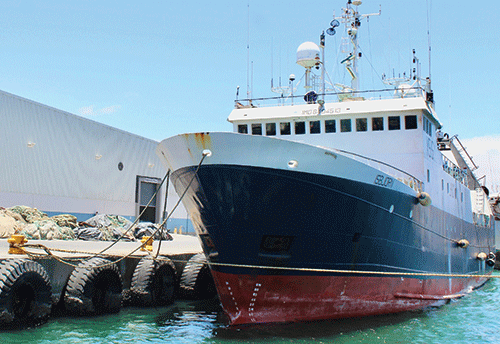The Auditor General (AG) has lamented the lack of proper financial control and accounting systems in place at the Marine Resources Fund over three years.
This is revealed in the Fund’s AG report covering the financial years 2019, 2020 and 2021.
The report, obtained by New Era, was released late last year.
In it, AG Junias Kandjeke lays bare a myriad accounting shortcomings at the Fund, which resulted in an adverse audit opinion.
“The financial statements do not present fairly the financial position of the Marine Resources Fund for the financial years ended 31 March 2019, 2020 and 2021, and its financial performance,” he states in the report.
The Marine Resources Fund was established to financially assist research and development in connection with sea fisheries.
The adverse opinion resulted from the blurred accounting lines between the marine resources fund and the fisheries ministry, overstated investments, lack of supporting documents to substantiate some expenditures, revenue management, and an absent credit policy.
“The audit observed that the Fund has negative balances in the trade receivables age analysis amounting to N$24.5 million (2019), N$34.1 million (2020) and N$56.8 million (2021). The Fund is recommended to ensure that it reconciles debtors’ balances as per the detailed ledger/age analysis to supporting documents,” Kandjeke said.
The Fund also did not provide supporting documents for trade receivables amounting to N$3 million (2019), N$3.01 million (2020) and N$1.7 million in 2021.
“It is recommended that the Fund ensures that all supporting documents are provided for audit purposes in terms of the State Finance Act,” the AG recommended.
What is more, the Fund failed to furnish the auditors with payment vouchers for transactions amounting to N$1.8 million for the 2021 financial year related to trade and other payables, prompting another recommendation.
“It is recommended that the Fund ensures that all supporting documents are provided for audit purposes in terms of the State Finance Act,” the AG said.
Furthermore, a difference of N$567 352 was noted between the financial statements amounting to N$2.1 million and the recalculated depreciation amounting to N$ N$ 1.57 million for the 2021 financial period.
It was recommended that the Fund should calculate its depreciation, based on the useful lives set out on their fixed asset policy.
The Fund did not disclose vehicles valued at N$5.5 million separately in the financial statement, nor in the notes to the financial statements as of 31 March 2021.
“It is recommended that the Fund should disclose and present the fixed assets in each respective class of Property, Plant and Equipment in the financial statements and the notes to the annual financial,” Kandjeke stated.
Another anomaly was that the Fund’s assets register was not updated with unique asset identification numbers, or other features that correspond to the physical assets.
It was furthermore noted that the asset register was not updated with the location of the asset.
“It is recommended that the Fund should ensure that an annual asset verification is performed, and that the fixed asset register is updated with sufficient information that enables confirmation of the audit test,” the chief public auditor said.
Reckless spending
Kandjeke was further disappointed in the Fund for what he termed “wasteful and fruitless” expenditure.
“The Fund is still making use of a consultant to process and prepare the financial statements, while the Fund incurred training costs amounting to N$77 000 in the 2016/17 and 2017/18 financial years. The total cost for the consultant’s engagement amounts to N$799 600. The Sage Pastel Accounting Software licensing fees amount to N$ 99 883 for the financial periods 2016/17 to 2021,” he lamented.
Additionally, the accounts payables’ age analysis for the years under review included debit balances amounting to N$2.2 million (2019), N$1.4 million (2020) and N$5.4 million in 2021, “which resulted in an understatement of trade and other payables”.
“It is recommended that the Fund should ensure that all accounts are reconciled regularly to reflect the true accounts’ payable balance at year-end,” the auditor further advised.
It does not end there, as the Fund recorded an amount of N$8 million twice in 2021 for a subsidy to the Namibia Maritime and Fisheries Institute (NAMFI) in the annual financial statements, therefore overstating its expenditure.
“It is recommended that the Fund ensures that transactions are recorded accurately in the annual financial statements,” the AG continued.
Meanwhile, no supporting documentation was provided for pre-payments related to the insurance of vessels valued at N$575 723 (2020) and N$575 723 in 2021.
There was also no supporting evidence provided related to Pay as You Earn amounting to N$156 607 (2020) and N$2.6 million in 2021.
“It is recommended that the Fund ensures that all supporting documents are provided for audit purposes in terms of the State Finance Act,” Kandjeke said.
The allowance for doubtful debts could likewise not be substantiated for the financial years 2019, 2020 and 2021. The Fund also does not have a credit policy in place. Furthermore, the auditors observed that the Fund’s trade receivables over 120 days and older were N$ 17.5 million (2019), N$44.4 million (2020) and
N$ 28.9 million in 2021, respectively.
“The Fund should ensure that it implements a credit policy, and provides for doubtful debts,” Kandjeke urged.
-emumbuu@nepc.com.na


